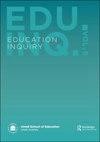A glimpse of a Nordic model? Policy and practice in the digitalisation of the K-12 school and teacher education in Denmark, Finland, Norway and Sweden: Editorial introduction
IF 1.6
Q2 EDUCATION & EDUCATIONAL RESEARCH
引用次数: 1
Abstract
The research symposium Teaching and Teacher Education in the Light of the Digitalised K-12 school – a Nordic Perspective, held in October 2019 at Umeå University, Sweden, was the third in a series of symposiums organised by the authors of this editorial to address broad-term challenges and possibilities concerning the digitalisation in K-12 schools and in teacher education. The included papers in this special issue of the Education Inquiry originate from this symposium. The first symposium, International Symposium on Informed Design of Educational Technologies – Enhanced Learning and Teaching, took place in October 2012 (Olofsson & Lindberg, 2012). The second symposium in October 2017 had a specific focus on Recent Trends in the Digitalisation of Nordic K-12 schools (Lindberg & Olofsson, 2018). While working on the special issue, a fourth symposium held in November 2020 specifically concerned Swedish and Norwegian Teacher Education in a Time of a Digital Transformation of Society. As the four abovementioned symposiums indicate, in a Nordic context, the question of digital technology in teaching and teacher education per se is not new, neither is it new in research (e.g. Caeli & Bundsgaard, 2019; Gudmundsdottir & Hatlevik, 2018; Ilomäki, Paavola, Lakkala, & Kantosalo, 2016; Olofsson, Lindberg, Hauge, & Fransson, 2015) or educational practice and policy (e.g. in Denmark, Strategy for Denmark’s Digital Growth, 2018; in Finland, The National Core Curriculum for Upper Secondary Education, 2019; in Norway, Digitalisation strategy for primary and lower secondary schools, 2017; and in Sweden, #skolDigiplan, 2019). Interestingly, the literature indicates that educational policies often emphasise the potential of digital technology to reform or even transform teaching, learning and assessment, but research reports that digital technology has not yet had the positive impact expected from policy (see Hammond, 2014; Vrasidas, 2015; Wastiau et al., 2013). With that in mind, we wanted the 2019 symposium to be an event aimed at identifying and exploring signs of a socalled Nordic model of building digital competence and improving digital technology use in the contexts of K-12 school and teacher education. The event was to support joint academic efforts to investigate what the Nordic countries potentially have in common and how we together can improve and develop various issues in theory, as well as policy and practice, concerning digital competence and the uptake and use of digital technology in teaching and teacher education. Former research in this field of interest indicates that elucidating such a thing as a Nordic model or a specific educational dimension to unite the Nordic countries is a rather challenging endeavour (cf. Blossing, Imsen, & Moos, 2014; Imsen, Blossing, & EDUCATION INQUIRY 2021, VOL. 12, NO. 4, 311–316 https://doi.org/10.1080/20004508.2021.1988451北欧模特的一瞥?丹麦、芬兰、挪威和瑞典K-12学校和教师教育数字化的政策和实践:编辑简介
2019年10月在瑞典乌莫大学举行的“从北欧视角看数字化K-12学校的教学和教师教育”研究研讨会是本社论作者组织的一系列研讨会中的第三次,旨在解决K-12学校和教师教育数字化的广泛挑战和可能性。本期《教育调查》特刊收录的论文来源于本次研讨会。2012年10月举行了第一次研讨会,即教育技术的知情设计——强化学习和教学国际研讨会(Olofsson和Lindberg,2012)。2017年10月举行的第二次研讨会特别关注北欧K-12学校数字化的最新趋势(Lindberg&Olofsson,2018)。在研究这一特刊的同时,2020年11月举行的第四次研讨会专门关注社会数字化转型时期的瑞典和挪威教师教育。正如上述四次研讨会所表明的那样,在北欧背景下,教学和教师教育中的数字技术问题本身并不新鲜,它在研究中也不是新的(例如,Caeli和Bundsgaard,2019;Gudmundsdottir和Hatlevik,2018;Ilomäki、Paavola、Lakkala和Kantosalo,2016;Olofsson、Lindberg、Hauge和Franson,2015)或教育实践和政策(例如,丹麦,《丹麦数字增长战略》,2018年;芬兰,《国家高中教育核心课程》,2019年;挪威,《中小学数字化战略》,2017年;瑞典,#skolDigiplan,2019年)。有趣的是,文献表明,教育政策往往强调数字技术改革甚至改变教学、学习和评估的潜力,但研究报告称,数字技术尚未产生政策预期的积极影响(见Hammond,2014;Vrasidas,2015;Wastiau等人,2013)。考虑到这一点,我们希望2019年的研讨会能够成为一场活动,旨在识别和探索所谓的北欧模式的迹象,即在K-12学校和教师教育的背景下建立数字能力和改善数字技术的使用。此次活动旨在支持学术界的共同努力,调查北欧国家可能存在的共同点,以及我们如何共同改进和发展有关数字能力以及在教学和教师教育中吸收和使用数字技术的各种理论、政策和实践问题。先前在这一感兴趣领域的研究表明,阐明北欧模式或特定的教育维度来团结北欧国家是一项相当具有挑战性的工作(参见Blossing,Imsen,&Moos,2014;Imsen,Blossing和EDUCATION INQUIRY 2021,第12卷,编号4,311-316https://doi.org/10.1080/20004508.2021.1988451
本文章由计算机程序翻译,如有差异,请以英文原文为准。
求助全文
约1分钟内获得全文
求助全文
来源期刊

Education Inquiry
Social Sciences-Sociology and Political Science
CiteScore
5.00
自引率
0.00%
发文量
34
 求助内容:
求助内容: 应助结果提醒方式:
应助结果提醒方式:


